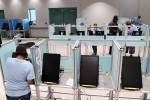STROKE AND MINORITIES
Dr. Rani Whitfield admits he is fighting an uphill battle.
Whitfield is an activist for health care in the black community, and is the spokesman for the Power to End Stroke, an initiative of the American Heart Association and the American Stroke Association that promotes education about strokes in minorities.
Whitfield says that blacks, especially, face an increased risk of developing heart disease or stroke.
"We have some of the highest incidences of high blood pressure in the world as a result of sedentary lifestyle and poor eating habits," Whitfield said. "And with the high incidence of obesity in the country, especially among African-American men and women, all of those risk factors coupled together increase our risk of not only heart disease but stroke."
A stroke is when the brain's blood supply is cut off or when a blood vessel bursts in the brain. Then, brain cells die because they don't receive ample amounts of oxygen.
According to the Centers for Disease Control and Prevention, stroke is a leading cause of disability and the third leading cause of death in the United States. More than 140,000 people die each year from strokes in America.
Blacks and other minority groups are facing an increased risk of stroke. Whitfield said that blacks are twice as likely to suffer from high blood pressure and stroke.
So what gives? Why do some minority groups face a greater risk of stroke than whites?
It's a multifactorial answer, Whitfield says.
Smoking is one element that can explain the increased risk. Eating poorly and not exercising are also risk factors.
Economic status usually forces these risk factors on minorities, Whitfield said. When people have no money, they are forced to eat junk food.
Eating fast food and nonhealthy items purchased from the grocery store can quickly add up. Not in price, but on the effect of the body. The constant regimen of nonhealthy food items can take a toll on the heart and add to the risk of stroke, Whitfield said.
Murray Flaster, M.D., Ph.D., an associate professor of medicine and a neurologist at University Medical Center says there is an increased incidence of stroke in the Southern and Southeastern regions of the United States known as the "stroke belt."
"Socioeconomic factors influence how often people go to the doctor and how fully able they are to be compliant with their doctor's advice," Flaster said. "Some medications and care can be expensive. It can be difficult to separate socioeconomic factors from ethnic and hereditary factors."
There just aren't enough options for poor minorities in the grocery store.
"The health food section in the store might be the size of a small bathroom," Whitfield said. "How do you combat that?"
The National Stroke Association notes that blacks in general have a higher incidence of smoking and being obese, which are two main risk factors for a stroke.
Education is one route to reverse those trends. Whitfield said there are so many misconceptions regarding strokes in minorities.
Many will say that it is in the genes -- if their parents were overweight, smoked and at an increased risk for a stroke, then they also are at an increased risk.
That's not the case.
"If you try to blame it on it being hereditary, that's not right," Whitfield said. "I think that's mainly a behavioral issue. It's poor eating habits, the portions of the food and lack of exercise."
Flaster says we should concentrate on the positive -- getting people to do what they should be doing.
"I don't think it's a lack of effort," Flaster said. "Obesity and hypertension can be obstacles to treatment, but I don't think it's a lack of effort. We need to do a better job of managing risk factors. The best way to treat a stroke is to prevent it. Reduce obesity. Treat hypertension early."
Flaster added that people with metabolic syndrome -- a major risk factor for stroke -- can reduce their risk by as much as 50 percent through diet and exercise.
Whitfield said there's a lot of work to be done to change the common misconception that poor health practices can be passed on.
"An obese child makes an obese adult," Whitfield said. "You've got to start educating the masses."
Adequate health care is another reason why many minorities end up having more strokes.
Whitfield said that many minorities can't afford to see the doctor. He said many people come to him with symptoms that could lead to a stroke, but they can't afford the blood test.
The fact that some symptoms are hard to catch doesn't ease the fight for minorities.
"High blood pressure, which is the number one risk factor for stroke, is such a silent disease," Whitfield said. "It doesn't hurt. You don't feel bad all the time. People just go on every day."
Whitfield says another problem is time. By the time many minorities are diagnosed as having a stroke, it is too late to do anything to prevent it.
That's why much of the effort to curb minority strokes has been focused on youth. Whitfield said that it's important to reach the youth before it's too late.
It doesn't take long for children to pick up on their parents' bad eating and exercise habits.
Another reason why reaching youth is important, Whitfield said, is because they can help reach out to their parents.
Many times, adults need to hear a voice of concern from someone in their own family.
"I sometimes lean on the children to put the guilt trip, for lack of a better word, on their parents," Whitfield said. "Like, if you die, I don't have anybody to take care of me. I love you. Please quit smoking. Please exercise, please lose weight, please take care of yourself."























